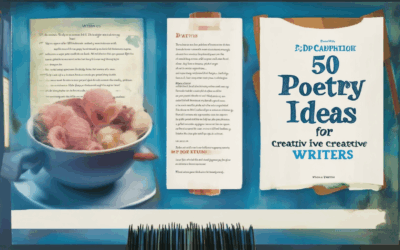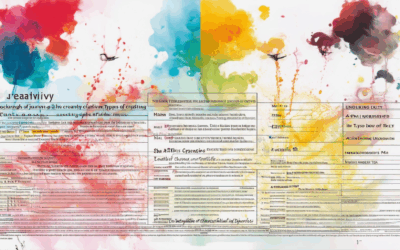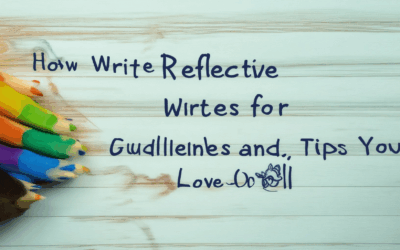The world of poetry offers a unique realm where words transcend boundaries and emotions resonate deeply. For those embarking on the journey of writing poetry, especially as newcomers, the prospect can feel both exhilarating and overwhelming. Whether you’re drawn to the brevity of short poetry or the profound depth of works exploring new beginnings, discovering your creative voice is a transformative experience. This guide aims to illuminate the path for aspiring poets, providing practical advice, resources, and insights to help you navigate the world of poetry writing with confidence and ease. From mastering poetic forms to finding the right platforms for submission, this comprehensive exploration will guide you through the intricacies of creating poetry that truly reflects your unique perspective. Embrace the journey, for poetry is not just a craft—it’s a celebration of your individuality and a bridge to connecting with others on a profound level.
Key Takeaways
– Choose a theme or subject to guide your poetry direction and capture personal emotions.
– Read widely and study established poets to understand diverse styles and techniques.
– Experiment with different poetic forms to discover your unique style and creativity.
– Use vivid imagery and metaphors to paint evocative pictures in the reader’s mind.
– Start simply with basic subjects and language before incorporating complexity.
– Edit and refine your work for rhythm, flow, and clarity.
– Join a poetry community for feedback, support, and inspiration.
– Practice consistently to develop your skills and grow as a poet.

How to Start Writing Poetry as a Beginner
Writing poetry is a rewarding journey that allows you to express your emotions, tell stories, and connect with your audience. Here’s a step-by-step guide to help you get started:
1. Begin with a Journal
Start by keeping a journal dedicated solely to your poetry. Write down observations, emotions, or experiences as they arise. This habit will help you develop a regular writing routine and provide material for future poems.
2. Observe the World Around You
Pay attention to the details in your surroundings. Describe what you see, hear, or feel. Whether it’s a sunset, a friend’s smile, or a quiet moment alone, these moments can inspire your poetry.
3. Read Poetry Regularly
Reading poetry is essential to understanding the craft. Start with classic poets like William Shakespeare or Robert Frost, then explore contemporary works. Study their use of imagery, metaphor, and rhythm to get a sense of structure and style.
4. Attend Poetry Events
Consider attending poetry readings, slams, or open mic nights. These events can provide motivation and feedback. They’re also great places to meet fellow writers and learn from their experiences.
5. Join a Writing Group
Find a poetry group or writing workshop to share your work and receive constructive feedback. Groups often provide a supportive environment where you can learn and grow alongside other aspiring writers.
6. Explore Different Forms
Experiment with various poetic forms like haiku, sonnets, or free verse. Each form has its own structure and requirements, allowing you to discover your unique style and preferences.
7. Use Writing Tools
Take advantage of online tools and apps designed for writers. These can help track your progress, generate prompts, and provide resources to improve your skills. Explore platforms like Silken Drum for community support and inspiration.
8. Set Realistic Goals
Establish achievable objectives, such as writing a poem each day or participating in weekly challenges. Start with shorter pieces and gradually move to longer forms as you become more confident.
9. Seek Feedback
Share your work with trusted friends or mentors who can provide honest feedback. Constructive criticism will help you identify strengths and areas for improvement, aiding in your growth as a poet.
10. Stay Patient and Persistent
Remember, writing poetry is a process. Don’t be discouraged by initial difficulties or negative feedback. Every poem is a step toward discovering your unique voice and style.
By following these steps and embracing the journey, you’ll soon find yourself on a path to creating meaningful and impactful poetry. Happy writing!
What Are Some Tips For Starting Poetry Writing?
Poetry is a powerful art form that allows writers to express emotions, tell stories, and explore the world in a unique way. For those just beginning, the process can feel overwhelming, but with the right guidance, it becomes manageable and even enjoyable. Here are some tips to help you get started:
1. Choose A Theme Or Subject
Start by selecting a theme or subject that resonates with you personally. Whether it’s nature, love, personal experiences, or abstract concepts, having a central idea can give your poetry direction. Consider the emotions or memories you want to capture and use that as your foundation.
2. Read Widely And Study Great Poets
Reading is one of the most effective ways to learn the craft. Explore works by established poets like Shakespeare, Dickinson, and Whitman to understand different styles and techniques. Pay attention to how they use imagery, rhythm, and structure. Mimicking their work can help you develop your own unique voice while giving you a sense of the possibilities in poetry.
3. Experiment With Different Forms
Poetry has many forms, from free verse to sonnets, haiku, and villanelles. Try them out to see which one feels most comfortable. Free verse allows for greater freedom, while traditional forms offer a structured framework that can be challenging yet rewarding. Experimentation is key to finding your style.
4. Focus On Imagery And Metaphor
Use vivid imagery and metaphors to paint pictures in the reader’s mind. Descriptive language is crucial in poetry, as it helps convey emotions and create atmosphere. Think about objects, scenes, or feelings you want to communicate and find creative ways to express them.
5. Keep It Simple Initially
Don’t overcomplicate things at the beginning. Start with simple subjects and straightforward language. As you become more confident, you can introduce complexity. The goal is to tell a story or evoke emotion, not to impress with complicated vocabulary.
6. Edit And Revise
Writing is just the first step. Editing is where you refine your work, removing unnecessary words and tightening your language. Read your poems aloud to hear how they sound and make adjustments for rhythm and flow. Remember, poetry is meant to be heard as well as read.
7. Join A Writing Community
Find local or online poetry groups where you can share your work and receive feedback. Engaging with others who share your passion can provide valuable insights and encouragement. Many communities host workshops or events that can further enhance your skills.
8. Practice Regularly
Poetry, like any skill, requires consistent practice. Dedicate time each day to write, even if it’s just a few lines. Over time, you’ll notice improvement in your technique and your ability to express yourself creatively.
Silken Drum encourages you to explore your creativity and share your unique voice with the world. Whether you’re writing for personal enjoyment or seeking a broader audience, remember that every poem is a step toward growth and self-expression. Happy writing!

What Are Some Tips For Starting Poetry Writing?
Poetry is a powerful art form that allows writers to express emotions, tell stories, and explore the world in a unique way. For those just beginning, the process can feel overwhelming, but with the right guidance, it becomes manageable and even enjoyable. Here are some tips to help you get started:
1. Choose A Theme Or Subject
Start by selecting a theme or subject that resonates with you personally. Whether it’s nature, love, personal experiences, or abstract concepts, having a central idea can give your poetry direction. Consider the emotions or memories you want to capture and use that as your foundation.
2. Read Widely And Study Great Poets
Reading is one of the most effective ways to learn the craft. Explore works by established poets like Shakespeare, Dickinson, and Whitman to understand different styles and techniques. Pay attention to how they use imagery, rhythm, and structure. Mimicking their work can help you develop your own unique voice while giving you a sense of the possibilities in poetry.
3. Experiment With Different Forms
Poetry has many forms, from free verse to sonnets, haiku, and villanelles. Try them out to see which one feels most comfortable. Free verse allows for greater freedom, while traditional forms offer a structured framework that can be challenging yet rewarding. Experimentation is key to finding your style.
4. Focus On Imagery And Metaphor
Use vivid imagery and metaphors to paint pictures in the reader’s mind. Descriptive language is crucial in poetry, as it helps convey emotions and create atmosphere. Think about objects, scenes, or feelings you want to communicate and find creative ways to express them.
5. Keep It Simple Initially
Don’t overcomplicate things at the beginning. Start with simple subjects and straightforward language. As you become more confident, you can introduce complexity. The goal is to tell a story or evoke emotion, not to impress with complicated vocabulary.
6. Edit And Revise
Writing is just the first step. Editing is where you refine your work, removing unnecessary words and tightening your language. Read your poems aloud to hear how they sound and make adjustments for rhythm and flow. Remember, poetry is meant to be heard as well as read.
7. Join A Writing Community
Find local or online poetry groups where you can share your work and receive feedback. Engaging with others who share your passion can provide valuable insights and encouragement. Many communities host workshops or events that can further enhance your skills.
8. Practice Regularly
Poetry, like any skill, requires consistent practice. Dedicate time each day to write, even if it’s just a few lines. Over time, you’ll notice improvement in your technique and your ability to express yourself creatively.
Silken Drum encourages you to explore your creativity and share your unique voice with the world. Whether you’re writing for personal enjoyment or seeking a broader audience, remember that every poem is a step toward growth and self-expression. Happy writing!

What Are Some Tips For Starting Poetry Writing?
Poetry is a powerful art form that allows writers to express emotions, tell stories, and explore the world in a unique way. For those just beginning, the process can feel overwhelming, but with the right guidance, it becomes manageable and even enjoyable. Here are some tips to help you get started:
1. Choose A Theme Or Subject
Start by selecting a theme or subject that resonates with you personally. Whether it’s nature, love, personal experiences, or abstract concepts, having a central idea can give your poetry direction. Consider the emotions or memories you want to capture and use that as your foundation.
2. Read Widely And Study Great Poets
Reading is one of the most effective ways to learn the craft. Explore works by established poets like Shakespeare, Dickinson, and Whitman to understand different styles and techniques. Pay attention to how they use imagery, rhythm, and structure. Mimicking their work can help you develop your own unique voice while giving you a sense of the possibilities in poetry.
3. Experiment With Different Forms
Poetry has many forms, from free verse to sonnets, haiku, and villanelles. Try them out to see which one feels most comfortable. Free verse allows for greater freedom, while traditional forms offer a structured framework that can be challenging yet rewarding. Experimentation is key to finding your style.
4. Focus On Imagery And Metaphor
Use vivid imagery and metaphors to paint pictures in the reader’s mind. Descriptive language is crucial in poetry, as it helps convey emotions and create atmosphere. Think about objects, scenes, or feelings you want to communicate and find creative ways to express them.
5. Keep It Simple Initially
Don’t overcomplicate things at the beginning. Start with simple subjects and straightforward language. As you become more confident, you can introduce complexity. The goal is to tell a story or evoke emotion, not to impress with complicated vocabulary.
6. Edit And Revise
Writing is just the first step. Editing is where you refine your work, removing unnecessary words and tightening your language. Read your poems aloud to hear how they sound and make adjustments for rhythm and flow. Remember, poetry is meant to be heard as well as read.
7. Join A Writing Community
Find local or online poetry groups where you can share your work and receive feedback. Engaging with others who share your passion can provide valuable insights and encouragement. Many communities host workshops or events that can further enhance your skills.
8. Practice Regularly
Poetry, like any skill, requires consistent practice. Dedicate time each day to write, even if it’s just a few lines. Over time, you’ll notice improvement in your technique and your ability to express yourself creatively.
Silken Drum encourages you to explore your creativity and share your unique voice with the world. Whether you’re writing for personal enjoyment or seeking a broader audience, remember that every poem is a step toward growth and self-expression. Happy writing!
What Are Some Tips For Starting Poetry Writing?
Poetry is a powerful art form that allows writers to express emotions, tell stories, and explore the world in a unique way. For those just beginning, the process can feel overwhelming, but with the right guidance, it becomes manageable and even enjoyable. Here are some tips to help you get started:
1. Choose A Theme Or Subject
Start by selecting a theme or subject that resonates with you personally. Whether it’s nature, love, personal experiences, or abstract concepts, having a central idea can give your poetry direction. Consider the emotions or memories you want to capture and use that as your foundation.
2. Read Widely And Study Great Poets
Reading is one of the most effective ways to learn the craft. Explore works by established poets like Shakespeare, Dickinson, and Whitman to understand different styles and techniques. Pay attention to how they use imagery, rhythm, and structure. Mimicking their work can help you develop your own unique voice while giving you a sense of the possibilities in poetry.
3. Experiment With Different Forms
Poetry has many forms, from free verse to sonnets, haiku, and villanelles. Try them out to see which one feels most comfortable. Free verse allows for greater freedom, while traditional forms offer a structured framework that can be challenging yet rewarding. Experimentation is key to finding your style.
4. Focus On Imagery And Metaphor
Use vivid imagery and metaphors to paint pictures in the reader’s mind. Descriptive language is crucial in poetry, as it helps convey emotions and create atmosphere. Think about objects, scenes, or feelings you want to communicate and find creative ways to express them.
5. Keep It Simple Initially
Don’t overcomplicate things at the beginning. Start with simple subjects and straightforward language. As you become more confident, you can introduce complexity. The goal is to tell a story or evoke emotion, not to impress with complicated vocabulary.
6. Edit And Revise
Writing is just the first step. Editing is where you refine your work, removing unnecessary words and tightening your language. Read your poems aloud to hear how they sound and make adjustments for rhythm and flow. Remember, poetry is meant to be heard as well as read.
7. Join A Writing Community
Find local or online poetry groups where you can share your work and receive feedback. Engaging with others who share your passion can provide valuable insights and encouragement. Many communities host workshops or events that can further enhance your skills.
8. Practice Regularly
Poetry, like any skill, requires consistent practice. Dedicate time each day to write, even if it’s just a few lines. Over time, you’ll notice improvement in your technique and your ability to express yourself creatively.
Silken Drum encourages you to explore your creativity and share your unique voice with the world. Whether you’re writing for personal enjoyment or seeking a broader audience, remember that every poem is a step toward growth and self-expression. Happy writing!

What is the Best Way to Start Writing Poetry if You’re New?
Writing poetry can be a rewarding yet intimidating endeavor for newcomers. To embark on this creative journey, consider the following steps to help you find your footing:
- Start Small and Often
- Keep a Notebook Close At Hand
- Read Widely and Deeply
- Experiment with Forms and Structures
- Join a Community of Writers
- Be Patient and Persistent
Begin by dedicating just a few minutes daily to writing. This consistency helps build momentum and allows your mind to become accustomed to capturing thoughts and emotions through words.
Carry a notebook or use a digital tool to jot down ideas, observations, and feelings as they arise. This habit fosters a natural workflow and helps in channeling inspiration effectively.
Immerse yourself in the works of established poets and authors. Reading diverse styles and perspectives broadens your understanding of poetry’s possibilities and helps you develop your unique voice.
Explore various poetic forms such as free verse, sonnets, haiku, and villanelles. Experimentation allows you to discover what feels most natural and meaningful to you.
Finding a poetry group or online community can provide valuable feedback, support, and motivation. Platforms like Silken Drum offer opportunities to connect with like-minded individuals and share your work.
Poetry is a craft that evolves over time. Don’t rush the process; embrace mistakes as learning opportunities and celebrate small victories along the way.
Remember, the goal is to enjoy the journey of self-discovery. With patience, practice, and a willingness to explore, you’ll find your voice and grow as a poet.




0 Comments